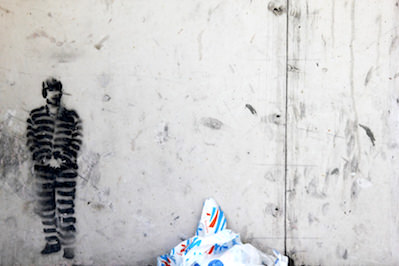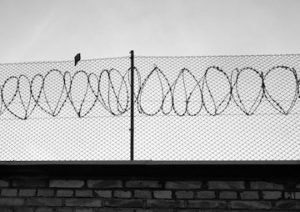Private Prisons Expect Surging Profits During the Trump Administration
People invested in the prison industry are set to get even richer off the mass incarceration of minority and low-income people when Donald Trump and the tough-on-crime nominee for attorney general, Jeff Sessions, take control of the federal justice system.
People invested in the prison industry are set to get even richer off the mass incarceration of minority and low-income people when Donald Trump and the tough-on-crime nominee for Attorney General Sen. Jeff Sessions take control of the federal justice system.
Investments in the prison company CoreCivic Co. became 43 percent more valuable the day after Trump’s election—the biggest percentage gain on the New York Stock Exchange that day. The value of the correctional services company Geo Group rose 21 percent.
The gains follow a decade of declining valuations that plummeted even further when the Obama administration announced in August that it would phase out the use of some private facilities. That decision was based on a Justice Department audit saying private facilities have more safety and security problems than state-run facilities.
During his campaign, Trump signaled support for private prisons. “I do think we can do a lot of privatizations and private prisons. It seems to work a lot better,” he told MSNBC in March.
Trump’s support for the prison industry could be devastating for undocumented immigrants and people convicted of minor crimes. AP reports that Immigration and Customs Enforcement holds up to 34,000 immigrants awaiting deportation.
Forty-six of the roughly 180 facilities in which ICE holds those immigrants are privately run, with about 73 percent of detainees held in the private facilities, the agency says.
“Trump was saying during his 100-day plan that mandatory minimums for people re-entering the country would be set at two years — that’s going to require a longer-term need for beds,” said Michael Kodesch, a senior associate with financial services firm Canaccord Genuity Inc.
Immigration detention centers are particularly profitable for private prison companies because they command a higher rate for each inmate bed, he said.
Yet what’s good for investors isn’t good for the country, said Bob Libal, executive director of Grassroots Leadership, a national nonprofit group that works to reduce incarceration and detention rates.
“”They’re handing the keys to a deportation machine over to the Trump administration,” Libal said. “And I think there’s no reason to believe that the Trump administration won’t drive that machine forward through human rights protections or due process protections people in the detention system.”
Jeff Sessions, Trump’s pick for attorney general, was among a handful of Republican senators blocking a bipartisan bill that would reduce lengthy sentences for low-level drug offenders.
For-profit prisons get their financing from Wall Street banks, which in turn collect profits from the prison industry. Nadia Prupis reports at Common Dreams:
Six banks have played a major part in bankrolling the two largest private prison firms, CoreCivic (formerly the Corrections Corporation of America) and the GEO Group: Wells Fargo, Bank of America, JPMorgan Chase, BNP Paribas, SunTrust, and U.S. Bancorp, according to the ITPI’s report, The Banks That Finance Private Prison Companies.
CoreCivic and GEO Group use the banks’ financing—which comes in the forms of loans, bonds, and credit—to buy up smaller companies that conduct residential reentry and sell ankle monitors for border agents to place on detained asylum seekers. That has allowed the two corporations to quietly monopolize the corrections and immigration enforcement industries.
The banks, meanwhile, profit by collecting fees and interest on those loans, or investing their clients’ money in the corporations’ shares. At the end of June 2016, CoreCivic and GEO Group were $1.5 billion and $1.9 billion in debt, respectively.
Activists and lawmakers have long criticized the privatization of the prison industry and its partnership with Wall Street. As Sen. Ron Wyden (D-Ore.) told International Business Times on Thursday, “It is wrong for private enterprises to bring a profit motive to incarceration and rehabilitation in this country, and I’m particularly concerned by how it’s fueled by tax law. In my view, most taxpayers would be disturbed to learn that their dollars are subsidizing corporate profits from the mass incarceration of minority and low-income Americans.”
Lawyers doubt their ability to protect their clients from the powerful commercial-legislative complex they face in the upcoming Trump administration.
Mercedes Castillo, an immigration and criminal defense lawyer in Los Angeles, told In These Times: “I am disheartened, stressed, anxious, and at a loss. Right now, after several of my clients have called, texted, emailed, Facebooked—sat in my office and cried—I have nothing to say but, ‘I will fight for you and with you.'”
—Posted by Alexander Reed Kelly
Independent journalism is under threat and overshadowed by heavily funded mainstream media.
You can help level the playing field. Become a member.
Your tax-deductible contribution keeps us digging beneath the headlines to give you thought-provoking, investigative reporting and analysis that unearths what's really happening- without compromise.
Give today to support our courageous, independent journalists.







You need to be a supporter to comment.
There are currently no responses to this article.
Be the first to respond.